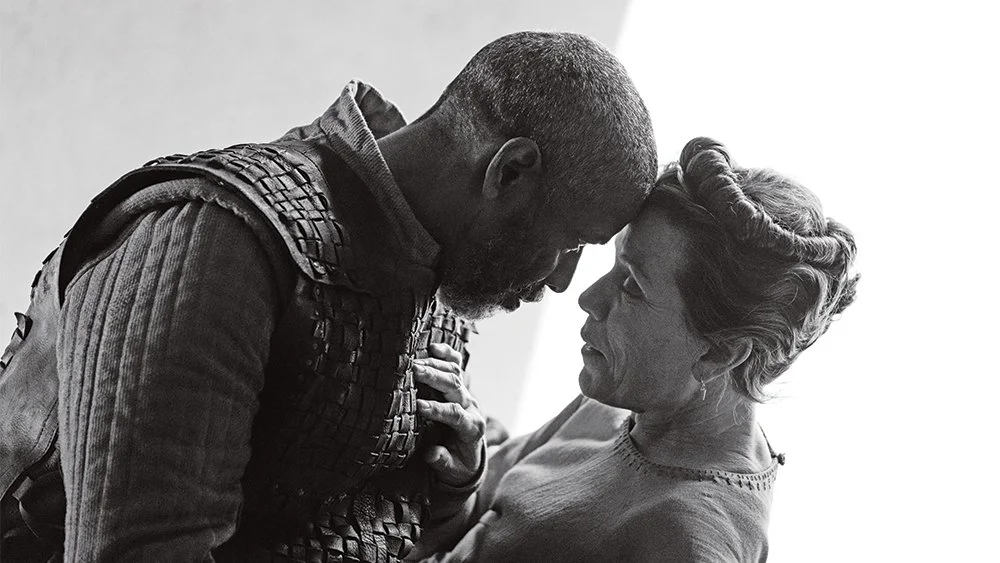THE TRAGEDY OF MACBETH
Directing: B+
Acting: B+
Writing: B
Cinematography: A
Editing: A-
Production Design: A
Let me start by saying I don’t know what the fuck I’m talking about. Take everything I say about The Tragedy of Macbeth with a grain of salt.
I was never anything even close to a scholar of Shakespeare. I read a good majority of his plays in a Shakespeare class in college, and retained almost none of it. Film adaptations of these 500-year-old plays have had a spotty record at best, when it comes to their ability to hold my attention. Modern reinterpretations of Shakespeare plays that still retain the original language have historically been more my jam. I’m thinking, of course, of Baz Luhrmann’s 1996 pop art version of Romeo + Juliet. Everything that movie was, Joel Coen’s The Tragedy of Macbeth is the complete opposite: minimalist, almost brutalist in design, black and white, subtle, and straightforward.
Still: I am one of those people who have difficulty following Shakespearean language. I barely managed to register the story, as I honestly can’t even recall if I have ever seen a production of Macbeth before, on stage or on film. I may very well have. This is what I think happened: Macbeth is told by a trio of witches that he’s destined to become king of Scotland, so, spurred on my his wife, he kills the current king, a decision that eventually drives him mad. He orchestrates some other gruesome murders here and there in the meantime. Am I close?
I can easily imagine lovers of Shakespeare, especially those with an intricate knowledge of the details and nuances of the original play, really loving this movie. God knows a lot of critics do: it has an astonishing “must-see” score of 89 on MetaCritic.com. The very worst of the reviews manage to be only barely mixed; absolutely no one hates this movie. I know many, many people who would be either bored to tears by it, or just completely baffled by the indecipherable language, or both. I’m not saying any of those people have any taste, mind you.
I do find myself wondering how much interest I would have had in this film had I not known it was directed by Joel Coen, a man whose previous work with brother Ethan Coen I have historically adored. This is Joel’s first solo venture, but he still enlists the ample talents of his longtime muse and wife, Frances McDormand, as Lady Macbeth. For the title character, Coen cast Denzel Washington, along with several other Black actors in key Scottish parts: Corey Hawkins as Macduff; Moses Ingram as Lady Macduff (god forbid any of these women get a name of their own); James Udom as Seyton; Olivia Washington as Children’s Nurse. There’s a few other recognizable faces in smaller parts as well, including Brendan Gleeson as the slain king; Stephen Root as Porter; and Harry Melling, formerly the portly Dudley Dursley in the Harry Potter films, as Malcolm, rightful heir to the throne.
The casting alone is worth some interest, and it must be said that Denzel Washington and Frances McDormand have a surprisingly subversive chemistry, and Washington carries the film capably. But truly, if there is any reason to see this film, it’s the stark production design and indelible black and white cinematography. It was shot entirely on constructed soundstages, always with incredible symmetry. The castles these people inhabit are almost always curiously empty of people besides the one or two characters we’re meant to be paying attention to, which both feels unnatural and draws attention to the visual design.
Joel Coen clearly wanted to evoke a vaguely otherworldly environment, and in that he succeeds handsomely. It’s a thing that helps the adaptation from stage to screen work. A lot of the time, it feels like you are indeed watching a stage play, especially given the amount of time characters speak to themselves. But, they are on gigantic sets that lean on the imposing sense of doom.
Speaking of which, I’m so out of it with Shakespeare, I didn’t even realize some very famous lines originated with it. “Out damned spot,” or “Doube double, toil and trouble, fire burn and cauldron bubble.” Characters say such things and I snap to attention. Hey, I know that!
I have to admit, I wanted, maybe even expected, to love this The Tragedy of Macbeth. “Love” is a strong word, often used as hyperbole. I did eventually find my way into the challenging language and the narrative, thanks in large part to Washington and McDormand. I can’t say I expect to return to it any time soon, if ever. But I really cannot stress enough how the cinematography and production design elevate the entire experience, immensely.
Let’s fuck shit up it’ll turn out fine!
Overall: B+

